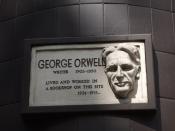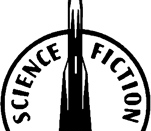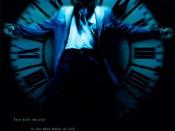The walls caving in on you, the night growing all the more still, all the more hopeless. I honestly did not realize what I was getting into when I chose '1984' & "Dark City" for my project. Their dark and gloomy moods seem to suck you into their world of hopelessness and insurmountable barriers; into a world of science fiction not often read and seen. It is a vision of a dark future, a foreboding warning to the present.
I honestly believe that literature and plain science in itself will not make a stunningly great combination. The terms would be too technical, the work too muddled up in facts. This is where the fantasy of science fiction comes into play. The science comes alive with the thoughts of what could be possible, what is perceived to be achievable, perhaps even what is not.
Science fiction has always served as a precursor to most everything we consider modern today.
The reality of technology and achievement was dreamt up far before it came to be. And thus is the illustrious role of science fiction. To dream up a future for us, to drop us into a setting we've yet to neither behold nor conceive.
Thusly so, most prose devoted to the genre convey wonderful worlds of fancy or perhaps the implications of a breathtaking new discovery that would forever change the world we live in. Which brings me to the reason as to why I selected 1984 and Dark city as topics for my essay.
Both the book and the movie bare another face of science fiction. Because for all the wonderment it can bring, it can also warn us of a future that looks bleak and uninviting. Both of them envelop you in their story where you see the characters devoid of hope.
Both of the stories present a future wherein a society exists in an ever changing reality. In the novel 1984, the 'party' continually edits, falsifies and changes the past and the present of its citizenry to perpetuate its existence. They use all means of forgery and distortion necessary to alter the truth to their convenience.
The strangers however in Dark City are unlike the party because they are external to the citizenry. The people do not know they exist party, which although is quite mysterious, does not hold the same amount of secrecy as the group of undead corpses that alters the reality of the city populace night after night.
The novel ( 1984 ) I was born in the year 1984. Today, sitting on my bed some 16 years later, I read of the novel that wrote about the year of my birth, some 40 years before it actually happened.
The novel written in 1949 foretold of the events in the life of an insignificant citizen in the imminent socialist society. The story, set in (what was then) the future, intoned a grim description of the days ahead riddled with rigid stratification and totalitarianism under the guidance of the powerful 'party'. The party controlled everything, from what you were rationed to what you thought. They could alter your past, your present and your future.
The conflict of the story comes when a deviant, Winston, begins to question the party's practices of deception and alteration. He struggles against the party, a struggle that he ultimately looses. A loss that was unquestionable from the very start.
Winston is first introduced at the beginning of the story with much simplicity, as with most of the story. The details of his life are unraveled slowly, taking time and patience with imparting his thoughts and memories. For a large part of the beginning of the novel you feel the book is holding back on you, letting a few tidbits here and there, but never revealing the entire truth. As you proceed with the events in Winston's life you learn a lot more, not only about him but also about the world around him.
The air of secrecy, misinformation and questioning is essential to the mood of the book. It conveys to you that as a third person viewer of Winston's retold life, you are only aware of what he is aware of, and that reminds you even more that what you both know to be true could actually be not.
The tone for the text is quite helpless and feeble. You could almost feel the walls crumbling in on the main character, especially during the final parts of the story. The piece is written with the loudest subtlety I've ever experienced. A large part of the text is, to be honest, unwritten.
The intermittent silence in thought of Winston pulls you into a dialogue with his character. Analyzing what he cannot say and what the party does not want to say to you and to Winston constitutes a significant portion of the book.
Also, there is a lot of irony utilized in the names of some settings and characters in the book, but never is irony better explained than in this piece by Orwell. The mere names of the various ministries of government: the ministry of peace(concerning itself with war), the ministry of truth(concerning itself with the falsification of facts) to name a few, were perfect examples of this.
The irony applied to a lot of the concepts the book tried to show too. The very concept of 'doublethink' was an irony to itself. Doublethink is one of the primary philosophies of the book and one of the tools the party used to control its members. It is a state in which you believed whatever the party told you to believe, and yet in the same time, you honestly believe that the knowledge imparted to you did not come from the party and you were not forced to believe it. Whatever knowledge the party broadcasted, you accepted as fact, without question and with utter faith.
The concept of the book is chilling even to contemplate. A line from the book states that whoever controls the present controls the past, and whoever controls the past controls the future.
The party legitimizes itself only by means of removing from reality anything that does not support the group. They argue that reality is existent only in the minds of people. And since they controlled the minds of people, they controlled reality. They altered the past, destroyed all records such that fact only lied in the memory of the people: memories which can be altered or convinced to be untrue, thus totally destroying the past, or in the words of O'Brien, making the past non-existent.
The Movie (Dark City) In the this movie, we are plunged into another abysmal world not much unlike that of Orwell's Oceania (the party's capital).
The film is set with the color and darkness of the early 50's to 60's noir films. We see a dark damp dingy city full of crime and chaos. Superficially, aside from the gothic and shady setting, nothing much seems out of the ordinary. But dig deeper into the celluloid and you discover strange occurrences happening around. Falsified memories that do not seem to exist, places you do not remember. People who are not who you remember them to be. The day-less city abounds with oddities.
The main character John Murdoch awakens alone in a strange hotel to find that he has lost his memory and is wanted for a series of brutal and bizarre murders. While trying to piece together his past, he stumbles upon a fiendish underworld controlled by a group of beings known as The Strangers who possess the ability to put people to sleep and alter the city and its inhabitants.
He begins to realize that everything in the city is fake and that nothing, in reality, exists outside the bogus and chilling experiment the Strangers are running on the occupants of the city. There is no permanence, no own personality and as he realizes at the end, no memory at all. The world John lived in was a world fabricated. Everything was fabricated, including himself.
No movie can ever have too much atmosphere, and Dark City exudes it from every frame of celluloid. The city's world isn't just a playground for the characters to move about in: it's an ominous place where viewers can get lost. We don't just coolly observe the bizarre, ever-changing skyline; we plunge into the city's benighted depths, following the protagonist as he explores the secrets of this grim place where the sun never shines.
Dark City offers a story that goes as deep as the visuals that front it. The film wasn't written for the passive viewer. To become involved in Dark City, thinking is mandatory. Unless you're puzzling out the answers alongside John Murdoch, you're going to miss more than one revelation. Very little is spelled out in this movie; the answers are all there, but you have to recognize them for what they are.
The movie spoke volumes about what really characterizes a human being. Weather it is resident in his/her memory or whether it was with his/her soul. The movie, like my book selection is played out quite slowly and silently, hanging you on with every twist and every discovery you make with John. With the memories you see him relive, and the ever-elusive quest to seek out the beach. A beach which never actually existed in the first place.
Both the book and the movie are positively haunting for me. They touch on issues wherein they make it seem that reality is totally alterable and it all depends on the way our mind is set to accept such changes. 1984 said once that reality only exists in your mind. And I believe it's true.
Both the film and the book tackle the concept of reality. They are about how we are defined by our reality and how reality, sometimes is solely dependent on us. They illustrate, although fictionally, how some people would go to great lengths to alter reality to suit their needs. Winston's reality was beaten out of him so he would simply accept the reality the party gave to him. They tortured him, read his mind and left him with no privacy. With a watchful eye, they concluded the contents of his mind and altered it.
In Dark City, the entire physical plain changed by itself. The world re-arranged its order to suit the newly implanted memories of the citizens of the city. Their realities too were changed. They took on different personalities and different lives all because their brain were reconfigured.
That is what my report is about actually. What is the human psyche based on? The total sum of all collective memories a person has? Were these memories wiped or altered, will the person still be the same? To a degree this field is already on the transition between science fiction and science fact. Hypnosis and mind control has long been portrayed as cartoonish, with the swinging pendulum and the twirling black spirals, but even today hypnosis is limitedly used clinically in various places. In theory, powerful hypnosis can make a person believe thing to be true, like for say, that a wound does not hurt, but it also has larger implications.
And brainwashing which also has been the but of many jokes in the past is also quite possible now. The brain is an electro chemical organ. What can stoop scientists from developing various substances that can wipe memories once the brain is mapped (which people are doing today).
They say the human brain is the only organ that is powerful enough to study itself. But what if in its desire to find out its inner workings it learns of what makes it what it is. What makes us human and what sets us apart. We are at the dawn of a new set of biological breakthroughs, and this time unlike the 20th century, which was riddled with advancements in physics, the coming years will see an emergence of tribulations





